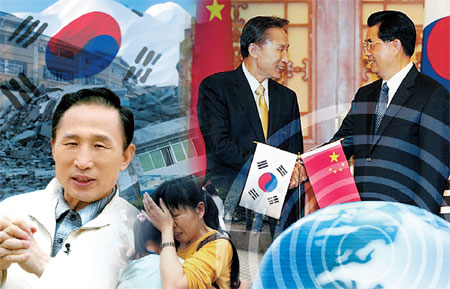Following is the sixth in a series of articles on the relationship between South Korea and China on the occasion of a May 27 summit between presidents Lee Myung-bak and Hu Jintao. - Ed.
President Lee Myung-bak paid a state visit to China from May 27 to 30, during which he met with President Hu Jintao, Prime Minister Wen Jiabao and Jia Qinglin, chairman of the Chinese People's Political Consultative Conference.
The summit meeting between Lee and Hu laid new ground for reinforcing the Korea-China relationship based on credibility and friendship, by welcoming Lee's participation in the opening ceremony of the Beijing Olympics and Hu's visit to Seoul later this year.
 |
In particular, the government and people of China were genuinely appreciative of Lee's visit to the earthquake-hit Sichuan province, where he delivered his condolences and sympathy. The Chinese government and press expressed sincere gratitude to President Lee, the first foreign head of state to visit the actual site of devastation, and praised him for exemplifying the saying "a friend in need is a friend indeed." Thus the visit to Sichuan not only accentuated the president's human aspect but also provided an opportunity to display to China's 1.3 billion people Korea's sincerity in sharing a neighbor's hardships.
Through President Lee's visit to China, the Korea-China relationship has been elevated from that of a "comprehensive cooperative partnership" into a "strategic cooperative partnership." In 16 years of diplomatic ties with China, the relationship that until now centered on economic cooperation and bilateral issues has matured into a future-oriented relationship that encompasses serious discussions on regional and global issues.
In the future, Korea and China, under the framework of a strategic cooperative partnership, will work together to achieve substantial progress in the areas of diplomacy, security, economy, culture and social and people-to-people cooperation.
Furthermore, through this state visit, the two countries were able to strengthen cooperative relations between their leaders in resolving the North Korean nuclear issue and promoting peace on the Korean Peninsula.
Both countries agreed to cooperate in achieving early resolution of the second phase of the six-party talks and to complete the implementation of the agreements. Such results can be attributed to a heightened understanding of Seoul's North Korean policy by the Chinese and to an assurance of a constructive role by China in achieving peace and stability on the Korean Peninsula.
Economically, several agreements aimed at expanding cooperation between Korea and China were made. Korean enterprises have a greater opportunity to make inroads into China's third-generation mobile telecommunications market. Cooperation in the area of finance, such as an agreement to promote bilateral investment in each other's stock markets, was also achieved.
In addition, Korean enterprises now have the opportunity to actively participate in the construction of Chinese nuclear power plants. An agreement was also made to strengthen mutual efforts in the areas of natural resources and renewable energy co-development, as well as Chinese petroleum reserve base construction.
Both countries agreed to continue reviewing a possible Korea-China FTA based upon the results of a joint study. Furthermore, the two countries have decided to promote mutual benefits and enhance cooperation in the areas of energy, finance, science and technology, and the environment.
Lee's recent visit will be seen as an opportunity for broadening the relationship between Korea and China. By reforming current visa policy, citizens of the two countries will find travel easier. In addition, both countries decided to expand government-invited youth exchange and home-stay programs as well as scholarship programs. With the signing of a Memorandum of Understanding Regarding Mutual Recognition of Academic Degrees in Higher Education, cooperation in the field of education will increase and local universities in Korea will eventually accommodate more Chinese students.
The upgrade to a strategic cooperative partnership has opened a new era of bilateral cooperation between the two countries by enlarging possible collaboration in global issues such as climate change, proliferation of weapons of mass destruction, terrorism and the United Nations Security Council reform. Thus, both countries have been able to prove themselves responsible members of the international society.
 |
All in all, President Lee's visit to China can be seen as a strategic visit. However, there still remains the task of substantially advancing the strategic cooperative partnership. The two governments and peoples, through close cooperation, must make concerted efforts to enhance and upgrade the Korea-China relationship.
In his speech at Beijing University, where he met the future leaders of China, President Lee reiterated that he got where he was not by chance, but as a result of relentless effort. Similarly, Korea and China will work together and strive ceaselessly to elevate bilateral relations to a strategic cooperative partnership both in name and reality.
'Remainder > Issue' 카테고리의 다른 글
| '6월결혼' 이윤석 신부 눈이 서경석과 닮았다네요 ^^ (0) | 2008.06.12 |
|---|---|
| 최근의 오해에 대해 네이버가 드리는 글 . (0) | 2008.06.12 |
| Mercedes следует за BMW (0) | 2008.06.05 |
| 촛불 집회!! 단독 생중계 (0) | 2008.06.04 |
| On-line show of force (0) | 2008.06.02 |